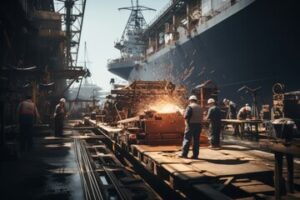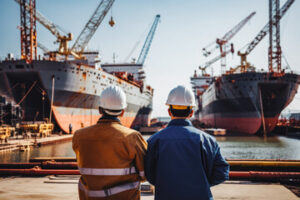Dock Construction Near Me refers to the designing, building, and maintaining of water-based structures. These structures are used for mooring boats and providing access to the water for recreational activities.

Float materials are important in the overall durability and design of a dock. Using roto-molded foam filled floats offers superior buoyancy and longevity. This makes them a better option for long term use as punctures or whole breakage have no impact on their buoyancy.
A dock is a structure that allows people to enter and exit water bodies like lakes, rivers, or oceans. It can also serve as a base for commercial and residential boating activities, or as a berthing space for cargo ships during port operations (as seen at seaport docks).
The job of a dock builder is to construct these waterfront structures using materials that are designed to stand up to the elements. These include pressure-treated lumber, composite decking, and, in some cases, concrete or steel. The construction process is often complex and requires a keen understanding of hydraulics, physics, and civil engineering.
Each dock type is designed to perform according to a specific set of environmental conditions. For example, a floating dock would be unstable in areas that experience frequent strong winds and tidal currents. This is why it is important to carefully consider the purpose of your dock before deciding on its design.
Aside from addressing environmental considerations, the design of a dock must be based on user requirements. In this regard, docks must be efficiently laid out to promote safety and ease of use. Traffic patterns should be clearly defined, and aisles should be wide enough for vehicles and pedestrians to pass easily. This will ensure that dock operations run smoothly, and prevent any accidents from occurring.
In addition, docks must be properly sheltered to protect them from harsh weather conditions. This is particularly important for fixed docks, which are permanently installed using pilings driven into the seabed. To make sure they can withstand hurricanes and other inclement weather, these types of docks are typically built with high-quality materials like steel, composite, and pressure-treated lumber.
It is important to note that while some states and municipalities do not require permits for dock construction, it’s still a good idea to check with them before beginning work. This will help ensure that the dock construction complies with local ordinances, and is not causing any unnecessary environmental damage. Additionally, the permitting process may provide valuable insight into the conditions of the area in which you plan to build your dock.
Materials
The materials used in your dock will make a big difference in how long it lasts, how much maintenance is required and how attractive the dock looks. There are several different options to choose from including aluminum, wood and plastic. The type of material you choose will also affect the cost of the dock construction and installation process. Quality materials may be more expensive upfront but will save you money in the long run by reducing the need for repairs or replacements.
When choosing a decking material, it is important to remember that the dock will be constantly exposed to water and sunlight. This means that it must be able to resist moisture, mildew and UV damage. Composite materials and wood treated with pressure are excellent choices for this purpose. These materials have adequate weight-bearing capabilities and are durable enough to withstand the Florida sun and other environmental factors.
A common choice for dock pilings is natural wood, which can look great on a waterfront property and blend in with the surrounding environment. However, it is important to use a high-quality, treated wood to ensure that the wood will not rot when in contact with the water.
Another excellent option for dock pilings is a synthetic material like fiberglass. This material is engineered to never rot or rust and requires minimal maintenance. It is a good choice for docks that will be regularly used by boats and other recreational equipment.
Floating docks are typically constructed with a combination of steel and fiberglass floats. This makes them affordable, highly flexible and portable. However, they are not well suited to supporting large water vessels and can be vulnerable to punctures and other damage. If the floats are damaged, the dock will deflate and will not be able to support boats or other recreational equipment.
Another alternative to traditional floats is roto-molded foam-filled floats. These floats are more expensive than traditional floats but offer better buoyancy and durability. Punctures and other damage will not affect the floats’ ability to hold up in the water, unlike traditional floats that will lose all buoyancy if punctured.
Installation
As with all construction projects, it’s best to work with a professional who has experience in dock construction. They will visit your property, evaluate what the project entails, and create an estimate for you. Be wary of contractors who don’t give an upfront estimate or try to pressure you into signing a contract before visiting your property.
Dock construction can be very complicated, and you’ll want to choose a contractor who understands your local water conditions and can build a safe and sturdy dock that will stand up to the elements. For example, the bottom of a lake or other body of water can be composed of different materials—sand, silt, rock, clay, or vegetation—which will affect the type of dock you can install. You’ll also want to be sure your dock is anchored on pilings (or poles) that are driven into the bed of the lake or other body of water. This ensures the dock will not move with changes in water level or current.
Another important factor in dock construction is ensuring the structure is constructed with a straight layout that offers maximum berthing length. Several types of docks are available, including rectangular docks, diamond docks, and quay docks. You can choose from a variety of decking as well, from modern through-flow composite boards to wood-grained and HDPE plastic, or even classic cedar.
You’ll also want to be sure your contractor understands what the manufacturer guidelines are for installation, and follows them to the letter. This will ensure the final product is structurally sound, and looks great. For example, if the manufacturer recommends that you mark a pencil line along every board to guide your placement of fasteners, be sure to do so. Otherwise, you may end up with uneven fastener placement or missing boards altogether.
It’s also important to include safety features in your dock, such as deflective edges and ramps for accessibility. This will help protect against injury from sharp corners or protruding objects, as well as to reduce the risk of people falling off the dock. It’s also a good idea to check with your local government regarding regulations around dock construction. While a private pond or some lake residences might not need a permit, beachfront properties and public regulated shorelines will likely require a license to construct a dock.
Maintenance
Whether a dock is a place to go boating, fishing, swimming or just relax, it’s one of our essential links with water. And, as the engineer of this essential interface, the dock builder has a very important role to play.
During the construction process, dock builders must ensure that the structure is safe and secure from wind, waves, currents, and any other environmental factors. Additionally, a good dock builder must make sure that the entrance channel is deep enough for larger ships to navigate into and out of.
Once the dock is completed, regular maintenance is critical. This includes inspection, cleaning, painting, and repairing. This prevents the dock from deteriorating or becoming unsafe for its intended use.
As a result, it’s important to make the time for these maintenance tasks. It can be difficult to find time in busy schedules, but it’s worth scheduling a time each month to thoroughly inspect and clean your dock. During this process, look for any broken boards, missing screws or nails, rotting boards, or other structural problems.
Another important maintenance task is to check for and treat any signs of rust. This prevents rust from spreading to other areas of the dock and can be done by applying a wood preservative or sealant. Lastly, docks should be cleaned regularly to remove any debris and clogs that can be caused by leaves or other materials.
In addition to the above-mentioned maintenance tasks, it is also crucial to keep an eye out for any ice damage that may occur during the winter. This can cause the entire dock to rot and will require expensive repairs.
